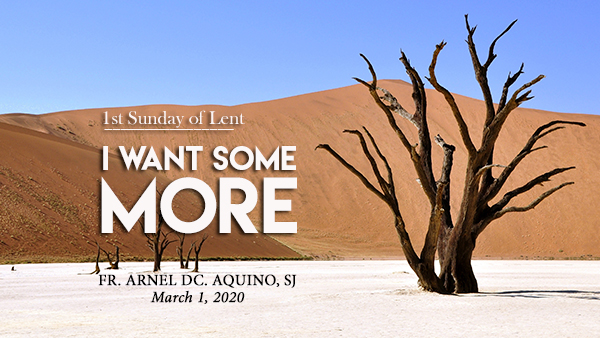


Fr. Arnel dC. Aquino, SJ
1st Sunday of Lent
March 1, 2020
If we still think that the story of Adam and Eve literally and historically happened, then we run into many problems. First, if the whole human race came from only two parents, do we presume that their children and their grandchildren had physical relations with each other to eventually populate the earth? Secondly, if all creatures God created were good, well, why did the snake become a tempter? And could snakes actually talk once upon a time? Thirdly, following from that, shouldn’t we name the snake as the origin of sin and not Adam and Eve? But we always say “sin began with Adam and Eve’s disobedience,” don’t we? So what gives? That’s just a few of many other problems we have to deal with if we believe that the Adam and Eve story happened exactly as Genesis tells it.
But if we don’t use a literal understanding of Adam and Eve, how might we still make sense of Genesis? Well, if we understand the story as a myth or a legend, then we’re off to a better start. A myth/legend is an old, old story that delivers a message about reality, even if it uses fantastical symbolism. So, when reading Genesis as a myth/legend, we shouldn’t get stuck with a naked couple, a talking snake, and a forbidden fruit mistakenly referred to as an “apple.” No; we see the story holistically and ask: “What does the story tell us about the reality of sin, about our reality of sin today?” That’s why myths/legends stick around for centuries, because their message is timeless.
Sisters and brothers, Adam and Eve had everything. They were in a state of abundance. They had everything they needed to live freely, to live comfortably, to thrive well. In fact, the whole universe was created for them. They didn’t have to fight for anything, or compete for anything, or entitle themselves as owners of anything. Everything God created was there for the taking.
But they wanted more. They wanted more than the abundance they were already bestowed, and they would get at that more regardless of God’s command. At some point, they stopped caring. “We want to be equal to God; no, wait, more than God.” So, they grabbed at that smooth, fleshy, shiny opportunity that promised the “more.” Nasa kanila na ang lahat. Pero gusto pa nila, sobra pa. Para makuha ‘yon, hinamak nila pati ang Diyos na siyang nagkaloob ng lahat.
Now, dear sisters and brothers, isn’t that the core of many of our serious sinning? In spite of being already blessed with freedom, friendship, power and sway, intelligence, comfort, money—we want more, and darn it, we will get to that more even at the cost of the goodness we already enjoy. Now it’s not a sin to want more. God gifted us all with drive, dynamism, desire which impels us to want to become better people, to provide more comfort for our families, to have more so that we can give more, especially to those who have less and have none. That’s not the “more” we’re referring to here. The “more” that forms the core of our serious sinning is that which has become a disordered “more,” a dominating, self-aggrandizing, and just downright greedy “more.” And we want it now. So, we cut corners. We cut people. We cut relationships. We leave them bleeding, yet, we feel quite victorious. “I want more power, more attention, more praise and honor from others, more sensual gratification, more control. I don’t care anymore what it takes, I want more.” That’s when original blessedness turns into original sin. “I don’t care. I. Want. More.”
“Turn these stones into bread! Use your miracles and prove to yourself you can turn stones to bread—and feed yourself. Throw yourself down the cliff, your survival will be even more proof that you’re the Son of God. Worship me and you’ll get more honor and power than you’ve ever seen!” See, sisters and brothers, temptation has not changed its tune. What Adam and Eve heard, Jesus hears, too. It tries to lure him to have more and get more and be more than what he’s already enjoying, and abundantly so. The temptation was delicious, strangely comforting, visceral.
But Jesus says no. “No. I have enough nourishment in my life, and not just by bread alone. No. I already have a Father who never lets me down. No. I have enough angels here on earth who protect me and love me. I am already richly blest. So, no.”
Should we stop striving for more? No. God wants us to be more compassionate, exercise more self-control, be more selfless, have more friends. God desires that we love people more than control them, forgive more than take greater offense, offer more apologies than demand them, value friendships more than our egos. But really, sisters and brothers, the seed that makes for our darkest temptations and sins germinates not from a desert of dearth, but from an Eden of plenty. Even when we have more than enough, we just can’t have enough.
As we move into Lent, sisters and brothers, maybe we can ask at some point: “What is the ‘more’ that I obsess over? Why must I have it at all cost and all the time? What does it promise me that I’m not already enjoying? And is it really worth my friendship—with God, with people? Is my ‘more’ worth it all?” Underneath all of this, dear sisters and brothers, is really a sense of gratitude. For we have been richly and quite lovingly blest.